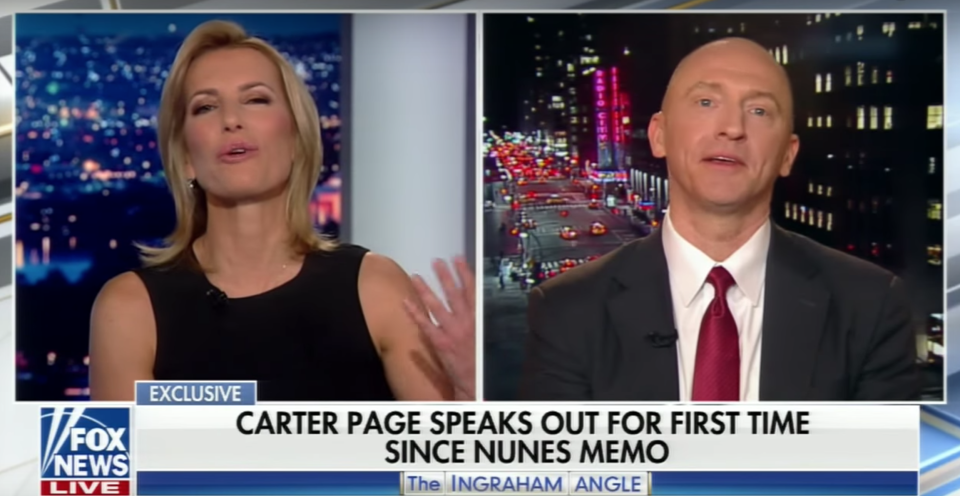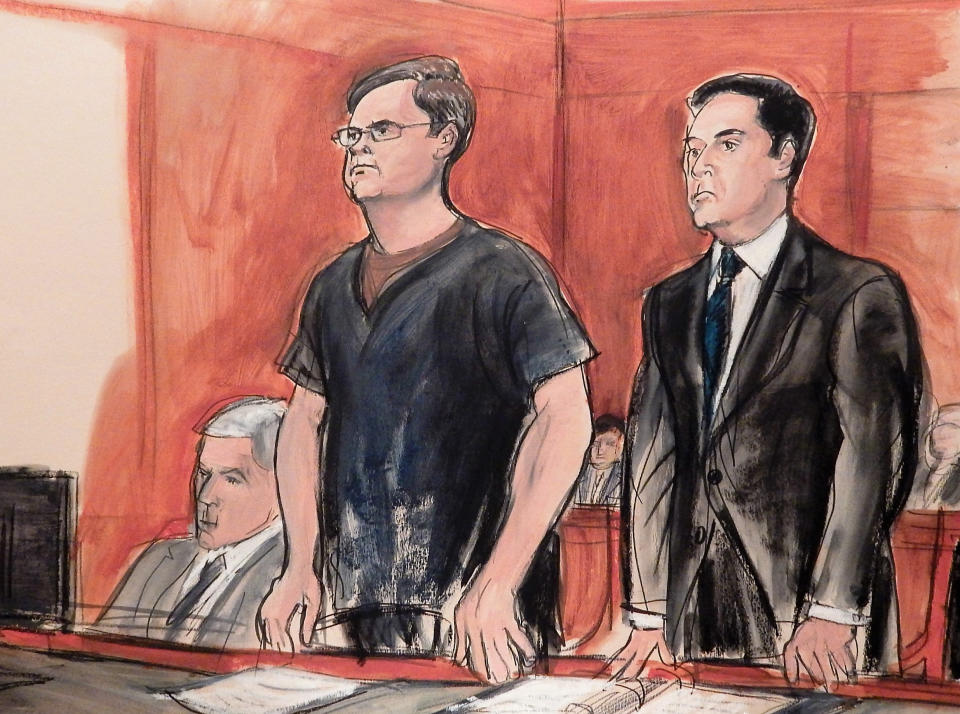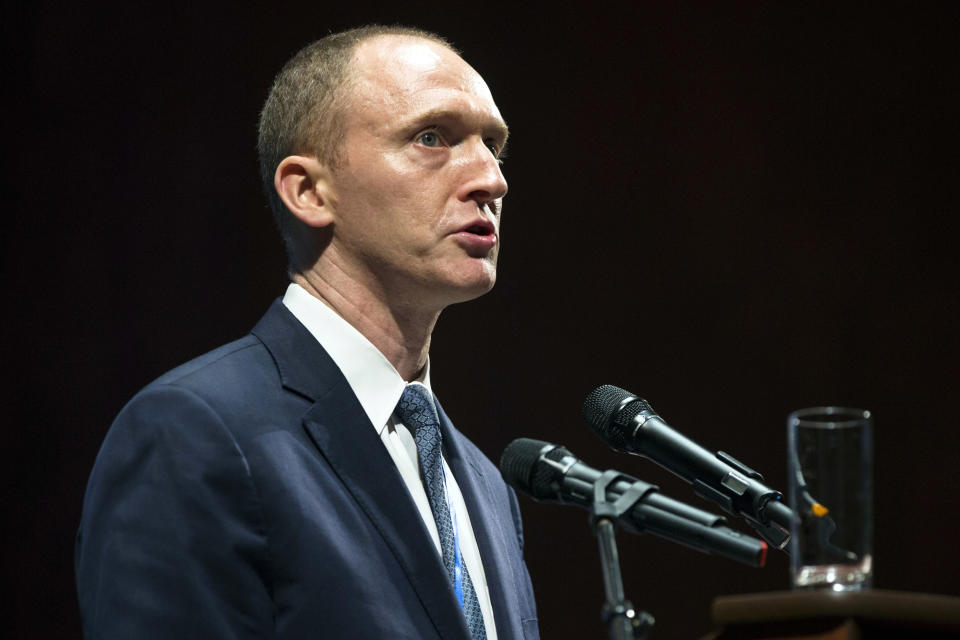Carter Page speaks out — and struggles — after explosive memo
Former Trump campaign adviser Carter Page, the man at the center of a controversial memo released by Rep. Devin Nunes, R-Calif., ostensibly to highlight abuses by law enforcement officials regarding surveillance, told Fox News that the published details were “even worse than I could’ve possibly imagined.”
But during the Monday evening interview with Fox News host Laura Ingraham and a Tuesday morning interview with George Stephanopoulos on Good Morning America, Page struggled to address arguments that his ties to Russia reasonably led to court-approved surveillance the month after the Trump campaign officially cut ties with him.

‘I had the privilege to serve as an informal adviser to the staff of the Kremlin’
Ingraham asked Page about an August 2013 letter, first reported by Time magazine, in which Page claimed that he had been serving as an “informal adviser to the staff of the Kremlin” in the first half of that year.
“Over the past half year, I have had the privilege to serve as an informal adviser to the staff of the Kremlin in preparation for their presidency of the G-20 Summit next month, where energy issues will be a prominent point on the agenda,” Page claimed in the letter to an academic press.
Page told Ingraham that the letter was “totally taken out of context.”
“I would never say ‘I had the privilege to serve as an informal adviser to the staff of the Kremlin,’” Ingraham countered. “I don’t get that.”
After Page began describing the G-20 and how President Trump had attended last year, Ingraham said “we know that” and pressed Page on why he claimed to be a Kremlin adviser. Page gave a stilted response: “I was offering — I was invited to provide some, ah — you know, they put together a roundtable of top energy experts [at G-20]. Literally people from around the world, top companies around the world, and I offered insights.”
“Carter, it sounds … like you were close to the staff of the Kremlin there,” Ingraham said.
Speaking to ABC, Page avoided the question of the letter and again described the G-20 summit.
“You can understand how that would raise questions and could lead to probable cause,” Stephanopoulos said. “On the one hand, at one point you say you’re an adviser to the Kremlin, then you’re an adviser to Donald Trump.”
‘I think he is an idiot and forgot who I am’
Asked about his previous interactions with the FBI, Page noted that he was a witness to a case involving alleged Russian spies‘ posing as diplomats and bankers in New York. In 2015, U.S. government prosecutors charged Russian intelligence operative Victor Podobnyy and two others with acting as unregistered agents of a foreign government. The spy ring was allegedly to obtain economic information, including details about U.S. sanctions on Russian banks.
According to wiretaps published in court records, Podobnyy said in early 2013 that he was attempting to recruit someone, who turned out to be Page. Page, 46, is a Navy veteran and founder of Global Energy Capital LLC, a New York-based financial institution focused on energy investments in developing markets. He worked as an investment banker in Russia in the early 2000s.
“I think he is an idiot and forgot who I am,” Podobnyy said of Page on the surveilled call. “He got hooked on [Russian oil company] Gazprom thinking that if they have a project, he could rise up.
“I also promised him a lot. … This is intelligence method to cheat, how else to work with foreigners? You promise a favor for a favor. You get the documents from him and tell him to go fuck himself.”
Page told Ingraham that Podobnyy “was a diplomat here in New York [who] I happened to meet at a conference, and we struck up a conversation. I met him one time after that.” He added that he had given Podobnyy a couple of course documents he had been using while teaching at New York University. “That was it.”
In written testimony to the House Intelligence Committee, Page called Podobnyy “a token Russian banker” targeted only because then-U.S. Attorney General Eric Holder wanted a “perfunctory accomplishment” at the end of his term.
Podobnyy was actually posing as an attaché to the permanent mission of the Russian Federation to the United Nations. Another operative in the alleged ring, Evgeny Buryakov, posed as a banker in the New York office of the Russian bank Vnesheconombank. Buryakov pleaded guilty to a charge of conspiring to act as a foreign agent and served 30 months in prison before returning to Moscow.

Stephanopoulos confronted Page about why he claimed to be a Kremlin adviser months after being the target of a Russian recruitment effort.
“So you were recruited at one point by a Russian agent, then you wrote yourself that you were an informal adviser to the Kremlin,” Stephanopoulos said. “So that does lead people to believe: ‘Is this guy working with Russia?’”
‘The government was able to persuade the court’
The FBI reportedly remained interested in Page, and the Trump campaign adviser’s July 2016 trip to Moscow intensified that interest. During the trip, which Page says the campaign approved but did not pay for, he gave a Russia-friendly speech at the New Economic School in Moscow that was critical of U.S. foreign policy.
Luke Harding, an investigative reporter who worked as a foreign correspondent in Russia, cited Moscow sources to report that Russian government officials arranged Page’s visit. “We were told: ‘Can you bring this guy over?’” one person told Harding.
Page told the House Intelligence Committee that he “briefly” greeted Russian Deputy Prime Minister Arkady Dvorkovich during the July 2016 trip, adding that he saw Dvorkovich again at a dinner in December 2016. The Trump campaign cut ties with Page in September 2016. Officials subsequently downplayed his role as informal, unpaid, and of minimal impact.

In regard to surveilling Page in October 2016, as the Nunes memo reveals, the U.S. government would have had to convince the court operating under the Foreign Intelligence Surveillance Act (FISA) that Page was “knowingly engaging in clandestine intelligence gathering activities for or on behalf of” Russia. The full body of evidence submitted to the court is not clear. The 2013 investigation — during which the FBI spoke with Page about the attempted recruitment — would have most likely served as part of the evidence cited in the application.
Other information in the FISA application was based on information gathered by Christopher Steele, a former British spy intelligence officer who was hired to look into Russia connections of then-candidate Trump. The salacious raw intelligence Steele produced became public in the form of an aggregate dossier after being passed around to reporters and political operatives for months. The Trump administration and the Nunes memo argue that because Steele was a subcontractor ultimately hired on behalf of the Democratic National Committee, the dossier and FISA orders are baseless.
FBI veterans and some legal experts argue that the memo offers no indication that the FISA process was abused. According to Asha Rangappa, a former FBI special agent for counterintelligence, to surveil Page’s communications in 2016 “the bureau would have had evidence that Page remained in contact with individuals he knew were affiliated with Russian intelligence.” Furthermore, Rangappa asserts, the three 90-day renewals of the FISA order cited in the Nunes memo “underscore that the government was able to persuade the court that Page continued his contacts and activities.”
As it stands, neither the Nunes memo nor Page’s interviews with Ingraham and Stephanopoulos have significantly bolstered the accusation that U.S. law enforcement officials abused their surveillance powers when it came to Page.
Nunes reportedly plans to release more memos related to “wrongdoing” at U.S. agencies.
Disclosure: Page is suing Oath Inc., Yahoo Finance’s parent company, over a 2016 article in Yahoo News regarding Page’s trip to Moscow.
———
Follow Michael B. Kelley on Twitter @MichaelBKelley.
Follow Yahoo Finance on Facebook, Twitter, Instagram, and LinkedIn.
Read more:

